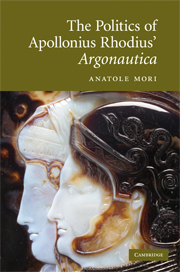Book contents
- Frontmatter
- Contents
- List of tables
- Acknowledgments
- List of abbreviations
- 1 Introduction
- 2 The politics of Alexandrian poetry
- 3 Strife and restraint among the Argonauts
- 4 Sexual politics in Lemnos, Colchis, and Drepane
- 5 Piety, mediation, and the favor of the gods
- 6 The bones of Apsyrtus
- 7 Quid denique restat: Apollonius and Virgil
- Bibliography
- Index
1 - Introduction
Published online by Cambridge University Press: 22 September 2009
- Frontmatter
- Contents
- List of tables
- Acknowledgments
- List of abbreviations
- 1 Introduction
- 2 The politics of Alexandrian poetry
- 3 Strife and restraint among the Argonauts
- 4 Sexual politics in Lemnos, Colchis, and Drepane
- 5 Piety, mediation, and the favor of the gods
- 6 The bones of Apsyrtus
- 7 Quid denique restat: Apollonius and Virgil
- Bibliography
- Index
Summary
Anyone accustomed to Homeric tales of heroic honor and undying glory is liable to be perplexed by Apollonius’ Argonautica. Nearly every line of the poem recalls an event or an expression from the Iliad or the Odyssey, yet from a dramatic perspective there is little to compare with Achilles’ wrath, Hector's death, or Odysseus’ revenge against the Suitors. If the Iliad is a poem of force, the Argonautica is a poem of political alternatives. It is a crisis for the Achaeans when Achilles refuses to fight after ten years of battle, while the Argonauts’ conflict with the Colchian army is patched up in only a few days. Their losses during the entire voyage are hardly Iliadic (four die unexpectedly, one is lost, two are left behind), and although their return, like the nostos of Odysseus, is delayed, it is a matter of weeks rather than years.
One of the delays occurs when the Argo is washed up by a shallow flood tide and stranded in the shoals of the Syrtes Gulf along the coast of Libya. The Argonauts lose hope and go their separate ways expecting a slow anonymous death in the desert sun. The guardian nymphs of Libya, called the Herossae, take pity on them and tell Jason that they must repay a debt to their mother if they wish to return home (4.1305–36).
- Type
- Chapter
- Information
- The Politics of Apollonius Rhodius' Argonautica , pp. 1 - 18Publisher: Cambridge University PressPrint publication year: 2008



